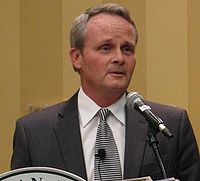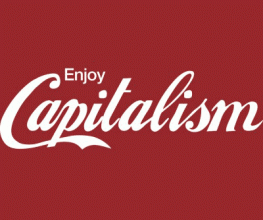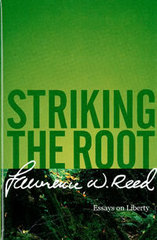By way of introduction, I just want to say that I think Mr. Lawrence Reed is one of America’s hidden treasures. He is well-known within his field of economics and conservative political thought, but in the mainstream world, he is largely unknown. It is a tragedy that Americans know about Justin Bieber, Brittany Spears and Miley Cyrus, and yet they do not know this man. I hope that you will take some time to familiarize yourself with this man who has been a voice of clarity and reason for over 20 years.
I read his articles when I was a teenager (I was homeschooled, what can I say?) and I am honored to introduce his work to you. I hope you learn a lot! — Israel Wayne
 Israel Wayne: What are a few of the major “schools” of economic thought and to which do you personally subscribe?
Israel Wayne: What are a few of the major “schools” of economic thought and to which do you personally subscribe?
Lawrence Reed: In economics, many schools of thought compete with each other on such issues as methodology (the premises we start from and the tools we use to build on them and study the economy), public policy implications and recommendations, the role of history or mathematics within economics, etc., etc. That’s not to say there isn’t significant agreement across the vast majority of those in the profession. Almost every economist accepts these core concepts wholly or largely: Savings, capital formation and investment are critical to productivity. Trade is a good thing, every bit as productive as production itself. Prices send important signals to both producers and consumers, resulting in rational allocation of scarce goods and services. Most economists also embrace the time-tested truism that government central planning of an economy is fraught with flaws and presumption, making it decisively unworkable if not irrational. The more economics you understand and the more removed you are from politics, the more you naturally appreciate the wondrous, unplanned, self-regulating spontaneity and efficiency of free people and free markets.
But economics is not a “hard” science like physics. Economists, like everyone else, are buffeted by circumstances, ideology, political influence and even character imperfections that may corrupt their thinking. Some think of the short-run and a few people, others are more thorough in their analysis and think of the long-run and all people, for example. There’s no room for disagreement about what gravity does when you drop an apple. Economists argue all the time, however, because we’re dealing fundamentally with a world where the future is full of uncertainties and every one of the planet’s six billion unique individuals have imperfect knowledge.
The most influential of the major schools of thought that emerged in the last century was the Keynesian school (named for British economist John Maynard Keynes, who saw the economy as composed of a handful of “aggregates” and government as a stimulator of demand through its spending). Its disciples perhaps stretched its doctrines further than Keynes himself might have prescribed. It became a significant intellectual justification for the growth of government, deficit spending and economic intervention. By the 1970s, it was rather thoroughly discredited when both price inflation and unemployment rose and confidence in government planning ebbed in the face of its evident failures. But Keynesian economics is undergoing at least a policy revival in our present day, as politicians justify massive increases in spending and deficits as necessary to recover from recession. Politicians tend to like Keynesian analysis because it essentially empowers them at the expense of everybody else, but many of us view the Keynesian model as irredeemably defective.
Another prominent school of thought is the Chicago school, with the late Nobel laureate Milton Friedman as its best-known advocate. The Chicago school has made many positive contributions to economics and its devotees are often devastatingly critical of government intervention. They come up short though, in my view, in a number of important areas, most notably in the area of money and who (or what) should be in charge of it.
I’m an advocate of what is known as the Austrian school. Its most notable scholars were Ludwig von Mises and Nobel Laureate F. A. Hayek, who were born in Austria. Austrian economists (most of whom have never been to Austria, by the way; it’s just the name for a school of thought) start from the premise that “the economy” cannot be best studied as lumps of lifeless stuff you can express with equations. It is composed of living, breathing, decision-making entities called individuals. All economic phenomena can and should be traced back to how individuals perceive, think, act and interact. Austrians see competition and the entrepreneur as critical factors in economic growth. We appreciate the role of incentives and of free prices as natural market-clearing mechanisms. We suffer from no “pretense of knowledge” that would suggest any group of people with power could rationally plan an economy from the top down. We are rigorous in our analysis of money as an invention of the market and are constantly warning that when government takes charge of it, the door is wide open to business cycles and currency debasement. We also tend to be among the strongest defenders of private property; ultimately, everything has an owner and it’s only a question of whether the person to whom it really belongs owns it, or somebody else with a gun owns it. No school has all the answers, but I think it is ever more apparent with time that the Austrian school starts from the right premises, analyzes the economy with the proper tools and humility, and yields the most fruitful insights of any school of thought.
Israel Wayne: Name the authors / economists who have influenced you the most.
Lawrence Reed: Dr. Hans Sennholz, who was chairman of the department of economics at my undergraduate alma mater, Grove City College; Henry Hazlitt, author of the classic, “Economics in One Lesson”; Ludwig von Mises, the greatest economist of the 20th century; Murray Rothbard, author of “Man, Economy and State”; Nobel laureates Milton Friedman, F. A. Hayek and James Buchanan; and Frederic Bastiat, a French statesman, economist and author of “The Law.”
Israel Wayne: What is the primary mission of the Foundation for Economic Education?
Lawrence Reed: FEE’s mission is to provide the best-available instruction in the principles of a free society to individuals of all ages whose minds are opening to freedom’s exciting challenge. Our organization seeks to be known as the guiding beacon of a vibrant, growing, international movement to educate for liberty.
Our vision is that people flourish in a free society where the individual’s creative, productive energies are unleashed; private property and the sanctity of contract are upheld; the use of force is confined to protecting the peace; competitive markets allocate scarce resources; and honesty is universally regarded as the best policy in both public and private affairs.
FEE believes a free society is not only possible, it is imperative because there is no acceptable alternative for a civilized people. Our vision for the future is that through education, men and women will understand the moral, philosophic and economic principles that undergird a free society. They will appreciate the direct connection between those principles and their material and spiritual welfare. They will strive to pass those principles on from one generation to the next.
The future FEE envisions is one in which individual expression gives rise to great, even presently-unimaginable achievements in culture, medicine, science, and education. Men and women will engage each other peacefully and voluntarily because they will respect each other’s uniqueness, rights, property and aspirations. No one will be so lacking in humility and introspection as to fancy himself better equipped to plan the lives of others than they, individually, are able to plan for themselves, their families and their businesses.
We carry out this important work through our magazine, “The Freeman,” our many seminars in the summer for high school and college students, a very vibrant Web site (www.fee.org), and appearances throughout the country before audiences, in the media and in front of high school debater groups. We are the oldest free enterprise think tank in the country and are very proud of the fact that our principles are utterly the same today as they were at our founding 63 years ago.
Israel Wayne: What do you believe are some important changes that need to take place for the American economy to recovery from this recession?
 Lawrence Reed: We may get a short-term lift from all the incredible money and credit expansion the Federal Reserve has engineered in the past 15 months but that will come at a horrendous cost of future price inflation and an even deeper, corrective recession or depression. To recover in a way that doesn’t cause future problems, we have to be willing to endure the pain of years of very bad policy and allow the economy to slough off all the bad, misdirected investments that Federal Reserve and other government policies have fostered. A solid, healthy and sustained recovery requires measures that hardly anyone in Washington possesses the courage and wisdom to implement, namely, drastic reductions in government spending, a balanced budget, abolition of the Federal Reserve, and sound money.
Lawrence Reed: We may get a short-term lift from all the incredible money and credit expansion the Federal Reserve has engineered in the past 15 months but that will come at a horrendous cost of future price inflation and an even deeper, corrective recession or depression. To recover in a way that doesn’t cause future problems, we have to be willing to endure the pain of years of very bad policy and allow the economy to slough off all the bad, misdirected investments that Federal Reserve and other government policies have fostered. A solid, healthy and sustained recovery requires measures that hardly anyone in Washington possesses the courage and wisdom to implement, namely, drastic reductions in government spending, a balanced budget, abolition of the Federal Reserve, and sound money.
Recessions and depressions are the awful price paid for previous bad policies, primarily inflation of money and credit. If you see a drunk lying in the gutter, you wouldn’t hand him another bottle of booze to help him out. You would chastise him for the sin of his excessive drinking the night before. You would tell him to stop doing that, no matter how good it might feel when he drinks. You would insist that he “dry out” as a precondition for restoring a healthy condition. As it applies to the economy, the federal government boozed up the economy with its “easy money” and jawboning banks to issue bad mortgages. Its response to the “hangover” that it produced is precisely the wrong one. It is preventing the necessary adjustments from cleansing the economy and is putting us on a reckless path to inflation, debt and national bankruptcy.
Israel Wayne: Does your personal religious faith in any way shape your view of macro-economics? Please explain.
Lawrence Reed: First of all, I don’t much care for the adjective “religious.” To me, “religion” is man’s attempt to gain God’s approbation through works. Christianity, by contrast, is a personal relationship with Christ that starts with God’s grace and one’s acceptance of Christ as his (or her) personal savior.
Secondly, I wouldn’t say my faith shapes my view of the economy any more than it shapes my understanding of the weather or how a car runs or a plane flies. Objective, observable facts, evidence and natural laws are the keys in such things, though I fully appreciate that the only reason we can even have such scientific tools is that we live in an ordered universe, itself a divine creation and gift.
Where my faith does play a part in economics is in the area of what’s right and what’s wrong. My understanding of Christian principles about human nature and proper behavior leads me to appreciate the uniqueness and preciousness of each individual. It leads me to oppose excessive concentrations of earthly power in any mortal hands. Christian principles call for honesty, humility, patience, respect for life and property, self-discipline and voluntary interaction over brute force. They argue definitively against cheating people through currency debasement, redistributing their wealth through taxation, or pretending that a handful of “experts” with power can or should plan the lives of everybody else. My Christian principles tell me that reforming the world begins and ends with individual self-reform and cannot be achieved by “enlightened” planners pushing the rest of us around.
The Eighth and Tenth Commandments against coveting and stealing by themselves should invalidate most of what the federal government does these days. “Thou Shalt Not Steal” is followed by a period, not a qualifier. It does not say, “Thou Shalt Not Steal except under the following conditions: the other guy has more than you do, you really want it, you’re absolutely sure you can spend it better than the guy who earned it, or if a politician is available to steal it on your behalf.”
Israel Wayne: Are there any government run institutions that you would like to see privatized?
Lawrence Reed: Government’s core responsibility is the protection of our rights to life, property and contract. That implies national defense, a court system, police (at the local level) and maybe a few other things. Everything else, privatize, which is to say it’s your responsibility and mine. That includes education. I don’t want government teaching our kids any more than I want it growing our food or writing our books. I have no faith that the bureaucrats or politicians can manage my health care or retirement. Sadly, most Americans refuse to grow up and assume the full responsibilities of living in freedom. They want things at other people’s expense and often don’t care who pays for it or whose dreams and aspirations have to be crushed so the politicians can extract the taxes to pay for it all. By treating our fellow citizens as milk cows, we are really behaving like children, not adults. I wrote an essay on this that I would recommend to your readers, entitled “The Love of Power vs the Power of Love”.
Israel Wayne: Do you have any global or national economic predictions you would like to make regarding the next five years?
Lawrence Reed: The future is tougher to predict than most predictors ever acknowledge but I will say this much: I think the next five years will present huge challenges economically. Government and its unconscionable debt are spiraling out of control. This must stop or financial disaster looms. I also worry a great deal about a general collapse of character that is behind all this fiscal lunacy.
Tell me if this sounds familiar: Erosion of character and culture. Self-reliance, hard work, and personal independence giving way to dependence upon the state. Soaring fiscal burdens of out-of-control entitlement programs, and politicians, oblivious to the costs, promising still more. Monumental sums for bailouts. Staggering increases in public debt. Concentration of power in the central government. A mad scramble by interest groups with endless claims on the treasury. Demagogic class warfare appeals. Ever higher taxes on the productive.
I could be describing ancient Rome, or recent America, where companies that lose billions are being bailed out by a government that loses trillions. Some say those companies are “too big to fail.” So we’re turning them and our economy over to an outfit that is too big to succeed. While most people would say it’s wrong to take a dollar from the responsible and give it to the irresponsible, our politicians tell us that if we do that a trillion times, it’ll be to our advantage. But if two wrongs don’t make a right, how can a trillion wrongs make anything right? It may be good politics for the moment, but it’s also madness and immorality writ large.
Once upon a time in America, most citizens expected government to keep the peace and otherwise leave them alone. We built a vibrant, self-reliant, entrepreneurial culture with strong families and solid values. We respected property. We understood that government didn’t have anything to give anybody except what it first took from somebody, and that a government big enough to give us everything we want would be big enough to take away everything we’ve got. We practiced fiscal discipline in our personal lives and we expected nothing less from the people in the government we elected, or we threw them out.
Somewhere along the way, we lost our moral compass. And just like the Roman Republic that rose on integrity and collapsed in turpitude, we thought the “bread and circuses” the government could provide us would buy us comfort and security.
As a people, we have to come to our moral senses and embrace the immutable laws of economics or we will suffer the same consequences as the decadent civilizations of the past. We have a lot of work to do.
Among the many Web sites I strongly endorse:
Foundation for Economic Education (www.fee.org)
Cato Institute (www.cato.org)
The Heritage Foundation (www.heritage.org)
National Center for Policy Analysis (www.ncpa.org)
The Freeman (www.thefreemanonline.org)

I appreciate Mr. Reed’s thoughts on the Austrian School’s non-inconsistency with Christianity.
I came to belief as a Christian, and a follower of Christ, after a close reading of the four Gospels in the search for any evidence that Christ advocates or comments on any social policy. He does not. Jesus is silent on policy prescriptions, from warfare to PTA clubs, from tax rates to bicameral legislatures, from Keynes to Hayek. Christ is disinterested in human classes or categories, and the structures and relationships amongst earthly classes.
Christ does repeat God’s insistence that we not exploit one another, that we not manipulate one another, that we not steal from one another, and that we not cause another to suffer.
Political manipulation of economies by governments and ruling elites, where one class of men is taken from in order to give to another class of men, directly violate Christian principles.
The welfare state doesn’t simply produce poor economic outcomes — it is morally wrong. All transfer payments from one household to another household involve stealing.
Political liberty and the economic liberty of the free market and unfettered contract between man and man, while not explicitly espoused by Christ (Jesus is interested exclusively in souls) are nevertheless not opposed to Christ’s teachings.
mb
I’m
Curious why he didn’t mention Thomas Sowell. Wondering his thoughts on this man’s premises.